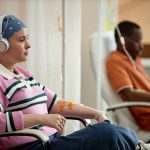-
November 15: The Week in Cancer News
Complications can affect men years after prostate cancer treatment, and many people eligible for lung cancer screening do not get it.
by Kevin McLaughlin
-
November 8: The Week in Cancer News
Early initiation of palliative care leads to fewer hospital admissions, and surgery that removes fewer lymph nodes is effective for localized muscle-invasive bladder cancer.
by Marci A. Landsmann
-
November 1: The Week in Cancer News
Long-term monitoring can catch side effects in childhood cancer survivors, and breast cancer screening rates remain low among transgender people.
by Thomas Celona
-
October 25: The Week in Cancer News
Asian American and Pacific Islander women face rising rates of early-onset breast cancer, and the risk for dying of COVID-19 is twice as high in people living with cancer.
by Eric Fitzsimmons
-
October 18: The Week in Cancer News
Immunotherapy lowers risk of side effects in advanced lymphoma, and an extra course of chemotherapy improves survival in cervical cancer.
by Marci A. Landsmann
-
October 11: The Week in Cancer News
Expanded dependent coverage improves cancer outcomes in young adults, and breast cancer treatment can lead to faster cell aging.
by Kevin McLaughlin
-
October 4: The Week in Cancer News
Study finds people who receive brain radiation often recover cognitive abilities over time, and report details breast cancer trends.
by Thomas Celona
-
September 27: The Week in Cancer News
Adding MRI to prostate screening can help limit overdiagnosis, and breast cancer patients who smoke have a higher risk of radiotherapy-related lung cancer.
by Eric Fitzsimmons
-
September 20: The Week in Cancer News
The AACR spotlights cancer advances and challenges in new report, and the FDA approves second CDK 4/6 inhibitor to reduce risk of recurrence in early-stage breast cancer.
by Marci A. Landsmann
-
September 13: The Week in Cancer News
Mammogram findings will now include information about breast density, and youth vaping is on the decline.
by Kevin McLaughlin
Cancer Talk
Physical Activity Linked to Lower Colon Cancer Recurrence
Participating in a structured exercise program after treatment was associated with a reduced risk of recurrence in people who had colon cancer.
by Sandra Gordon
Gaps in Survivorship Care Leave Unmet Needs After Cancer TreatmentA survey of head and neck cancer survivors reveals that many are not getting adequate survivorship care and may not even know it is available.
by Cameron Walker
Improving Communication for Deaf Cancer PatientsAfter a cancer diagnosis, people who are deaf or have hearing problems can struggle if accommodations don’t meet their communication needs.
by Eric Fitzsimmons
Is Immunotherapy Right for People Hospitalized With Advanced Cancer?Researchers find no evidence that immune checkpoint inhibitors benefit cancer patients getting inpatient care. They urge earlier consideration of palliative care.
by Kyle Bagenstose














